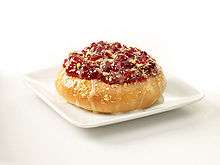Kolach
 Larger koláč, called "frgál", typical of the Moravian Wallachia area | |
| Type | Sweet bread |
|---|---|
| Region or state | Central Europe |
|
| |

A kolach (plural kolache, also spelled kolace or kolacky /kəˈlɑːtʃi, -tʃki/,[1] from the Czech and Slovak plural koláče, sg. koláč) is a type of pastry that holds a dollop of fruit, rimmed by a puffy pillow of supple dough.[2] Originating as a semisweet wedding dessert from Central Europe, they have become popular in parts of the United States. The name originates from the Czech, and originally Old Slavonic word kolo meaning "circle", "wheel". The word kolache may also be used to describe a meat filled pastry (esp. in some parts of Texas). However, this probably refers to a klobasnek. A klobasnek is often thought to be a variation of the kolach (koláče); however, most Czechs hold the distinction that kolache are only filled with non-meat fillings. Unlike kolache, which came to the United States with Czech immigrants, klobasniky were first made by Czechs that settled in Texas.
Kolache celebrations
Several cities, including Verdigre, Nebraska; Wilber, Nebraska; Prague, Nebraska; Caldwell, Texas;[3] East Bernard, Texas; Crosby, Texas; Hallettsville, Texas; Prague, Oklahoma; St. Ludmila's Catholic Church in Cedar Rapids, Iowa; and Kewaunee, Wisconsin[4] hold annual Kolache Festival celebrations.
Montgomery, Minnesota, is the "Kolacky capital of the world"[5] and holds an annual festival known as Kolacky Days. Verdigre, Nebraska, stakes the same claim with their Kolach Days.[6] Prague, Nebraska, claims to be known as the home of the world's largest kolache. Both Caldwell and West, Texas, claim the title of "Kolache Capital" of the state.[7]
Haugen, Wisconsin is the Kolache Capital of Wisconsin. The village is a Bohemian settlement that celebrates its Czech Heritage during an annual festival (Haugen Fun Days). Kolaches are a staple of the village's festival with Kolache sales, bake-offs, and tastings.
Still, other communities in the United States hold Czech-American festivals, where kolache may be found.
It was the sweet chosen to represent the Czech Republic in the Café Europe initiative of the Austrian presidency of the European Union, on Europe Day 2007.
There are Kolache Factory locations in Tustin, California & Albuquerque, New Mexico that are the only Western U.S. locations that sell kolache.
Related dishes

A related dish is a klobasnek, which is popular in central and southeast Texas. It often uses similar bread but is filled with a link of sausage or ground sausage. Some people also refer to these as kolache, but they are more accurately referred to as a "pig in a blanket".[2] They may also contain ham, cheese, jalapeño, eggs and bacon/sausage, potato, etc., and resemble a "pig in a blanket". Czech settlers created klobasniky after they immigrated to Texas.[8]
See also
- Kalach: East Slavic, Southern Slavic and Romanian bread
- Kołacz: Polish pastry
- Koloocheh: Iranian pastry
- Vatrushka: East Slavic pastry
References
- ↑ "kolacky". Dictionary.com Unabridged. Random House. Retrieved 2016-01-22.
- 1 2 "Czech, Please: 2000s Archive : gourmet.com". Prod.gourmet.com. 2011-08-01. Retrieved 2012-02-20.
- ↑ "Michele Casady, "Rain and kolaches? Czech"". Bryan-College Station Eagle, September 13, 2009. Retrieved October 24, 2009.
- ↑ http://agriculturalheritage.org/?page_id=336
- ↑ "Montgomery, Minnesota City Information". US-MN: ePodunk. Retrieved 2012-02-20.
- ↑ "Village of Verdigre". Village of Verdigre. Archived from the original on 5 September 2010. Retrieved 16 March 2012.
- ↑ https://www.tsl.state.tx.us/ref/abouttx/capitals.html
- ↑ Siegel, Jeff (January 2014). "The Kolach Trail". Texas Co-Op Power: 11.
External links
| Look up kolach in Wiktionary, the free dictionary. |
| Wikimedia Commons has media related to Kalachi. |
- Kolach Video produced by Wisconsin Public Television